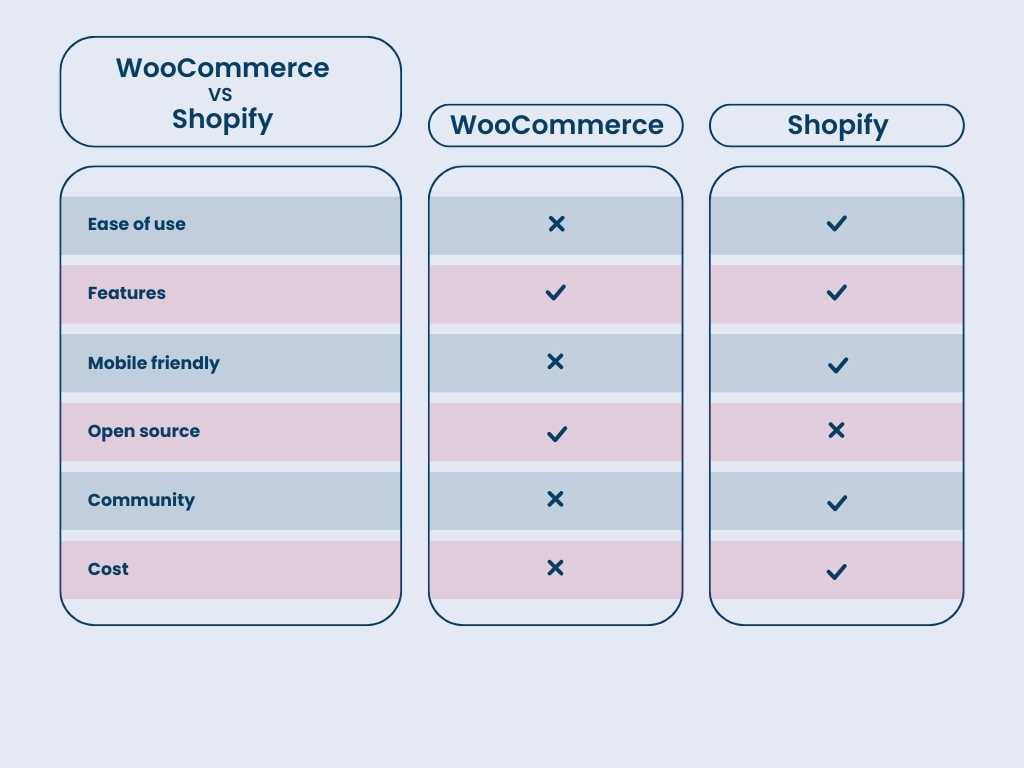Shopify vs WooCommerce: Online Store Solutions
Shopify vs WooCommerce, Which suits your online store? Let’s deep dive through both and find out which is the perfect e-commerce platform for you to begin.
In today’s digital landscape, having a powerful yet reliable e-commerce platform is crucial for online businesses to grow. With great options available, two platforms have risen to the top as leaders in this industry:
- WooCommerce
- Shopify
This article will analyze and compare these two powerhouses, examining their features, benefits, and suitability for various business needs.
It doesn’t matter if you’re a founder or just starting your online venture; understanding the differences between WooCommerce and Shopify is essential in making an informed decision.
So, let’s delve into this all-inclusive comparison and discover which platform best suits your e-commerce objective.
Table of Contents
Shopify vs WooCommerce: An Overview

Shopify and WooCommerce have appeared as dominant players in the e-commerce landscape, each offering unique advantages and catering to different business requirements.
Shopify is a popular e-commerce platform that provides an all-in-one solution for building and managing online stores. It offers a user-friendly interface with powerful features and reliable hosting, making it an appealing choice for young businessman seeking simplicity and convenience. You can create a stunning professional online store quickly and easily with it, even with limited technical knowledge.
On the other hand, WooCommerce is an open-source e-commerce plugin designed to integrate seamlessly with WordPress, the world’s most popular content management system. It empowers users to transform their WordPress websites into fully functional online stores. With this, you gain access to a vast array of customization options, flexibility, and the benefits of the WordPress ecosystem.
Shopify vs WooCommerce: Feature Comparison
When comparing Shopify vs WooCommerce, it’s essential to consider their cool features and capabilities.
It provides many built-in features, including inventory management, secure payment gateways, order management, and abandoned cart recovery. Its App Store offers various extensions and plugins to enhance your store’s functionality.
WooCommerce, being an open-source solution, offers immense flexibility and customization. It provides broad features for product management, inventory control, tax settings, and various payment gateways. Additionally, you can enhance your store’s functionality using plugins from the huge WordPress plugin repository.
Pricing and Cost Comparison
Pricing is a critical factor when choosing an e-commerce platform. Shopify offers different pricing plans, from basic to advanced, with additional transaction fees for third-party payment gateways. While these plans come with a monthly fee, they include hosting, security, and customer support.
In contrast, WooCommerce is free to use, but you must consider additional costs such as domain registration, hosting, SSL certificates, and premium extensions. The expenses of running an online store may depend on your specific requirements and the hosting provider you choose.
Ease of Use: Shopify vs WooCommerce
Regarding ease of use, Shopify excels with its intuitive interface and simplified setup process. It provides a guided approach that allows users to create their stores quickly, choose a design theme, and start selling products without technical complications.
WooCommerce, integrated with WordPress, offers a sharp learning curve for beginners. However, it provides a familiar WordPress interface and leverages the existing content management system, making it ideal for users already comfortable with WordPress.

Shopify vs WooCommerce for Dropshipping
Dropshipping is a popular business model, and both WooCommerce and Shopify offer features to support this venture.
WooCommerce provides plugins like AliDropship and WooDropship that integrate with popular dropshipping platforms, allowing you to import and manage products from suppliers easily. It also offers inventory management and order tracking functionalities.
On the other hand, Shopify has dedicated apps like Oberlo and Spocket that streamline the drop-shipping process. These apps enable you to import products from various suppliers, automate order fulfillment, and track inventory effortlessly.
WordPress VS Shopify: A Deeper Comparison
One advantage of WooCommerce is its integration with WordPress, the widely-used content management system. This integration allows you to leverage the powerful features of WordPress, such as content creation, SEO optimization, and extensive plugin availability. It run smoothly with the most popular page builder plugins on WordPress such as Elementor and WPBakery Page Builder. It provides a seamless way to manage your online store and content from a single platform.
In contrast, Shopify offers a self-contained solution detached from WordPress. While it provides some integrations with WordPress through plugins like Shopify Buy Button or Shopify Lite, it lacks the whole WordPress ecosystem’s depth and flexibility.
Conclusion
In this overall comparison of Shopify vs WooCommerce, we have explored their features, pricing, ease of use, and suitability for different business needs. Let’s summarize the key points and provide a verdict based on the comparison.
Both of them have established themselves as leading e-commerce platforms, but they cater to distinct requirements.
Shopify is well-suited for entrepreneurs looking for a;
- Hassle-free setup
- Robust support
- Scalability.
Shopify is particularly advantageous for those who prioritize simplicity and convenience.
On the other hand, WooCommerce, being an open-source plugin integrated with WordPress, offers;
- Unparalleled flexibility
- Customization options
- Access to the vast WordPress ecosystem
It is ideal for users who value complete control over their online store, desire extensive customization capabilities, and are comfortable with the WordPress environment.
To make an informed decision, consider your unique requirements and preferences. If you prioritize ease of use, convenience, and complete support, Shopify might be your better choice. However, if you seek customization, flexibility, and the ability to leverage the power of WordPress, WooCommerce could be the optimal solution.
Ultimately, the decision depends on your specific use case, technical expertise, scalability needs, and budget.
Carefully assess factors such as the complexity of your products, desired level of control, integration with existing systems, and long-term business goals.
Remember to evaluate the pricing structures, additional costs, and the learning curve associated with each platform. Consider exploring demos, trial periods, and user reviews to gain hands-on experience and insights from existing users.
In conclusion, both WooCommerce and Shopify offer robust e-commerce solutions, but their strengths lie in different areas. You can choose wisely under your corporate objectives by thoroughly considerate your requirements and considering the insights provided in this comparison.
